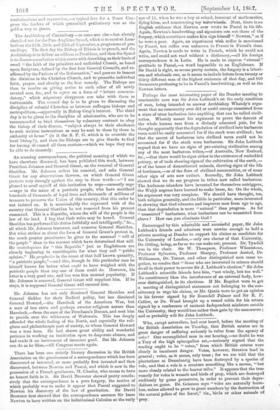An amusing correspondence, the political meaning of which we have
elsewhere discussed, has been published this week, between President Johnson and General Grant, on the removal of General Sheridan. Mr. Johnson orders his removal, and asks General Grant for any observations thereon, on which General Grant protests very strongly against the step in these words :—" I am pleased to avail myself of this invitation to urge—earnestly urge —urge in the name of a patriotic people, who have sacrificed hundreds of thousands of loyal lives and thousands of millions of treasure to preserve the Union of this country, that this order be not insisted on. It is unmistakably the expressed wish of the country that General Sheridan be not removed from his present command. This is a Republic, where the will of the people is the law of the land. I beg that their voice may be heard. General Sheridan has performed his duties faithfully and intelligently," &c., all which Mr. Johnson traverses, and removes General Sheridan. But what strikes us about the form of General Grant's protest is, the much greater prominence he gives to the assumed " will of the people " than to the reasons which have determined that will. He ventriloquizes for " this Republic " just as Englishmen are already beginning to ventriloquize for what they call "public opinion." He prophesies in the name of that half known quantity, " a patriotic people,"—and this, though in this particular case he himself knows far better what ought to have weighed with the patriotic people than any one of them could do. However, his letter is a very good one, and has won him unusual popularity. If Mr. Johnson is removed, General Grant will supplant him. If he stays, it is supposed General Grant will succeed him.






























 Previous page
Previous page